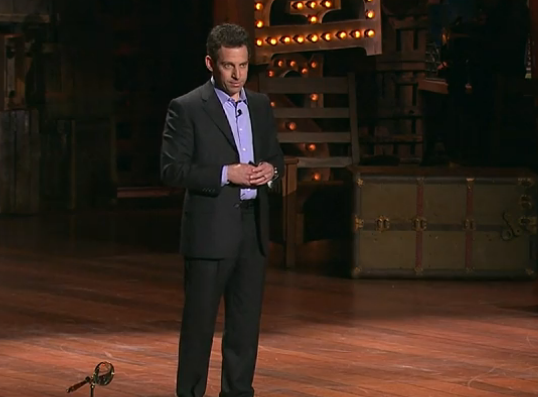And we know that it's possible to move along this continuum
我們知道我們可以解決這些持續已久的問題
towards something quite a bit more idyllic,
走向一個較為理想的狀況
to a place where a conference like this is even conceivable.
像我們現在這樣,齊聚一堂,和平討論
And we know -- we know -- that there are right and wrong answers to how to move in this space.
我們知道,清楚知道,想要達到這樣的境界,有對的,也有錯誤的方法
Would adding cholera to the water be a good idea? Probably not.
在水中加入霍亂病毒是對的嗎?大概不是
Would it be a good idea for everyone to believe in the evil eye,
每個人都相信邪惡之眼的魔力
so that when bad things happened to them they immediately blame their neighbors? Probably not.
于是當某些不幸事件發生,他們馬上就開始怪罪他們的鄰舍?大概也不是

There are truths to be known about how human communities flourish,
我們應該去理解人類社群邁向繁榮的方法
whether or not we understand these truths.
無論我們現在能不能理解
And morality relates to these truths.
或把這些事實和道德做聯結
So, in talking about values we are talking about facts.
當我們討論價值,我們就是在討論事實
Now, of course our situation in the world can be understood at many levels --
世界的現況可以用很多不同層次來看
from the level of the genome on up to the level of economic systems and political arrangements.
從染色體的層次一直到經濟體系和政治協議的層次
But if we're going to talk about human well-being we are, of necessity, talking about the human brain.
但如果我們回去思考人類幸福的議題,我們必須談到人類的大腦
Because we know that our experience of the world and of ourselves within it is realized in the brain
因為我們知道我們對世界的看法、我們的體驗和感知都是由大腦建構的
whatever happens after death.
無論死后會怎樣
Even if the suicide bomber does get 72 virgins in the afterlife, in this life, his personality
就算背著炸彈自殺死后能得到72個處女,在此生,他的人格
his rather unfortunate personality -- is the product of his brain.
這令人遺憾的人格,也是由他的大腦所產出
So the contributions of culture -- if culture changes us, as indeed it does, it changes us by changing our brains.
于是,文化的貢獻是,是因為文化會改變我們的想法,也就是改變我們大腦的思考模式











